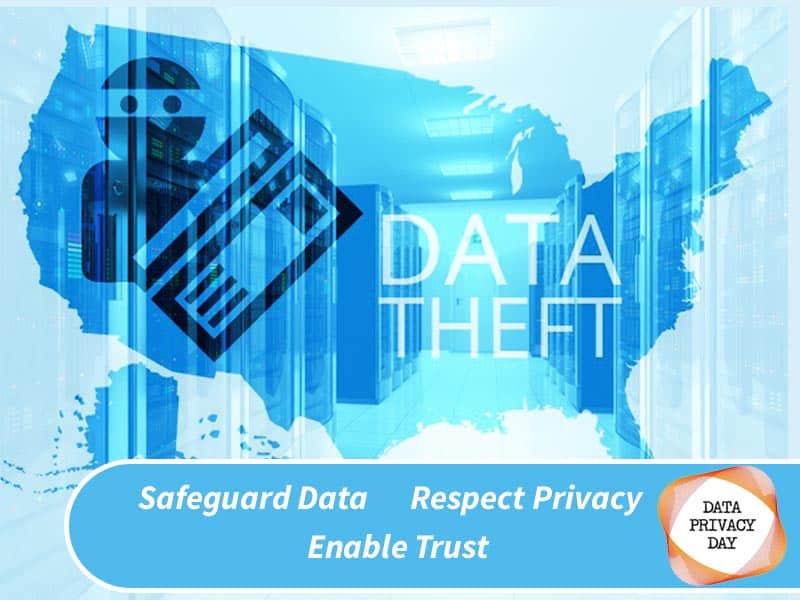
- Security Round Table
- Data Privacy Day – History
- The Objective
- Types of Data That Require Protection
- Steps that You Can Follow to Secure Data Privacy
- What Data Security Experts Have to Say About Privacy
- Byron Acohido - Pulitzer Prize Winner
- Fahmida Y. Rashid
- Robert Siciliano
- Bruce Schneier
- Rebecca Herold
- Xavier Mertens
- Dave Piscitello
- Sorin Mustaca
- Nick Sullivan
- Chris Wysopal
- Chris Hadnagy
Data Privacy Day 2015: Top Experts Comment on Privacy Issues (+Infographic)
Data theft is a serious issue and major concern for everyone, from behemoths like Apple to bootstrapped startups and consumers. Recently, US military social media accounts got hacked, and you may also be aware of the famous Sony hacking case, and the list goes on…
According to a report by Privacy Rights Clearing House, in the United States alone, more than 600 million records containing sensitive information have been stolen since January 2005.
This shows how pervasive the effect of data theft is and why data protection is crucial.To address this issue, an international effort was undertaken in 2008, declaring January 28th Data Privacy Day; to raise awareness and to ensure that data privacy and blog protection become a priority for online users.
We want to help spread the word about Data Privacy Day 2015 and that’s why we’ve created this massive post which will help you in several ways: you’ll learn about data privacy – how can you be and stay safe online and protect your identity. We’ll also cover the history of Data Privacy Day and show a nice shareable infographic with a lot of facts.
If you’re a blogger or journalist and you’re looking for nifty quotes for your article – we have you covered. We invited 9 data privacy and security experts to comment and give advice on digital privacy and security. Among them are Robert Siciliano, Bruce Schneier and Rebecca Herold.
The icing on the cake is our featured privacy round table discussion with Pulitzer Prize winner Byron Acohido and security journalist Fahmida Y. Rashid who writes for SecurityWeek and PCMagazine.
Security Round Table
Data Privacy Day – History
The 113th US Congress adopted a non-binding resolution, S. Res. 337, in 2008 that supports January 28 of every year throughout the United States and Canada to be observed as the “National Data Privacy Day”.

European nations signed the first international treaty concerning data privacy, Convention 108, on January 28, 1981. Since then, Data Protection Day has been celebrated on January 28th throughout Europe.
The Objective
Personal data, financial records, intellectual property, and other valuable online information are the areas of interest that lure digital villains to steal, cripple and forge, leaving you and your business shaken.

They further use this data to empty your bank accounts, misuse credit card details to initiate transactions against your name, or they can even sell your personal information to a third-party for a huge amount of money.
Hence, you need to establish strong security to save your data from these virtual pirates. Through robust data protection, you can safeguard your network, computers, and mobile devices so that valuable information is not misused.
To summarize, Data Privacy Day is observed to:
- Educate consumers and spread awareness that will help them understand the risks and benefits of sharing personal information, showing them the various ways their personal information can be collected.
- Educate consumers by providing them accurate, simple, and reliable advice that ensures better protection and active management of their virtual lives.
- Stir up businesses to look after their data and confidential information through clear discussion, and educate their staff about established privacy and security control.
Types of Data That Require Protection

The collection and dissemination of data through technology with the public expectation of privacy and the underlying personal, legal, and political implications are referred to as data privacy or data protection.
This concern will exist wherever personal, confidential, or other sensitive information is collected, stored,or shared―in the digitized world or otherwise. Privacy issues can derive from the improper or non-existent disclosure control of information. These data privacy and protection issues can arise due to various kinds of information. Some of these types are recognized below as:
With the growth of social networking, more and more people are posting their personal information, images, and videos online, which, if not monitored and protected through strict privacy controls, can be hacked by online goons for their selfish interests.
Various search engines enable users to collect personal data about individuals easily across multiple sources through proper data mining. Nearly everything is accessible online today, so only a controlled amount of information should be presented on portals and sites.
According to an Identity Theft Report, approximately 15 million residents in the US are exposed to identity fraud activities each year, incurring financial losses of more than $50 billion. This is a clear example of why you need to be careful while posting your information online.
Due to potential damage to their employment or insurance coverage, an individual may not be comfortable revealing their medical records to others. Medical records also will allow others to access a certain degree of patients’ personal information.
Steps that You Can Follow to Secure Data Privacy
Here are couple of steps you can take to ensure your private data is safe.
- Ensure using password protection and restriction as the first steps to establish sturdy data privacy. Avoiding the use of passwords is quite similar to leaving your home unlocked, which invites goons to steal your data and breach privacy.
- An easy way to monitor the information about you online is to use the Google Alert setting for your name. Just enter the name and the variations of it, so you will be notified whenever you are mentioned online.
- When you are not using your online accounts, make sure that you sign out of them. This will reduce the amount of tracking on your web activity as well as prevent the next user from snooping through personal details This is especially important when you are using a public computer.
- Avoid giving out email, phone numbers, zip code or other personal details which may prove to be vulnerable later on. These can get the hackers close to your secured information, helping them steal it.
- Encrypting your device is essential to establish strong data protection. Encryption refers to monitoring and scrutinizing the contents through an encryption key before it gets to your hard drive. On a Mac machine, FileVault does the job,while Bitlocker needs to be used by PCs for proper encryption.
- To establish hard security on your smart devices, remember to turn on the two-step authentication in your email account – which will ensure that even if a stranger gets your password, he or she will not be able to sign into your account.
- Try to make most online purchases through cash, avoiding online transactions that seek your bank account details.
- Restrict what you post online through privacy settings on social networking sites so that all the information that you post is shared and accessed by the known network.
- Browser history and cookies need to be cleared on a regular basis, thereby reducing the risk of exposure regarding your behavior and activities online.
- Resort to an IP Masker such as Tor to hide online whereabouts. This ensures that your online activities are not easily tracked or followed.
- Install the compatible anti-virus for your system and continuously update it to secure all your activities on your device, from online browsing to downloading files.
Data Privacy Day is a reminder to of all us that these steps will help reduce cyber-crimes and keep us safe. In the words of Michael Kaiser, NCSA’s Executive Director:
“With so many of our day-to-day activities carried out online, Data Privacy Day seeks to inspire everyone to manage their digital lives with concrete, simple, and actionable steps.”
What Data Security Experts Have to Say About Privacy
We asked the top data security experts what’s their take on current privacy issues in our digital society. You can read their comments and advice below covering a wide range of areas.
From personal online privacy in social networks to business data protection and the Internet of Things.Make sure to take out your notepad and jot down some ideas.
Byron Acohido – Pulitzer Prize Winner

Communicate with your employees. All employees must fully grasp what constitutes unacceptable behaviors, and monitoring tools and policies can both support productivity and cover the gaps. Vouch for you partners. Control access to sensitive data and apps. Limiting and monitoring partner access can be done in smart ways.
Byron Acohido, ThirdCertainty.com
Fahmida Y. Rashid

But there are things you can do, such as thinking about what kind of things you post on social networks, restricting your privacy and security settings on your accounts, and turning on security and privacy features in browsers.
If you have a choice between using a software or online service that offers you security features and one that doesn’t, reward the company that recognizes privacy.
Fahmida Y. Rashid
Robert Siciliano

The current state of privacy will continue to erode unless consumers recognize they have a choice and their actions and inaction is what determines the outcome.
Robert Siciliano, IDTheftSecurity.com
Bruce Schneier

Our privacy will continue to erode unless we recognize that we have both a political and a marketplace choice to make, and that only deliberately choosing privacy will ensure that we have privacy.
Bruce Schneier, CTO of Co3 Systems, and author of “Data and Goliath: The Hidden Battles to Collect Your Data and Control Your World.”
Rebecca Herold

Governments must realize that there are ways to have both, it is not an either/or choice. Businesses and organizations need to consider implementing privacy protections into their services and products as a business necessity that will improve their business, not something that takes away from business.
Especially when they are creating new online services, apps, and smart gadgets that will become part of the Internet of Things. And every person must decide that their privacy is important to preserve; they must demand government , businesses and organizations to implement policies and processes that will enable privacy preservation.
But people cannot solely depend on others to maintain their privacy. They must also be proactive and willing to learn how to protect their own privacy by being wiser online when sharing information, by recognizing scams and social engineering schemes, by knowing how to change privacy controls in their computing devices, and by implementing strong security and privacy controls within their own personal wireless networks. Everyone must address privacy in today’s hyper-connected data world.
Rebecca Herold, privacyprofessor.org & hipaacompliance.org
Xavier Mertens

Think about a smart thermostat which will control your home heating system. It will also know when you’re at home… or not! What’s your way of living, your habits. Like cloud solutions, risks must be properly assessed before connecting them to the Internet (which is often mandatory). Such “smart” devices are not so smart…
Xavier Mertens, blog.rootshell.be
Dave Piscitello

Government agencies that surveil, collect or publish any information that is personal or sensitive in nature is a potential privacy threat. The final threat is you. You are ultimately responsible for containment or leakage of far more personal information than you imagine quite simply because most humans are social beings.
We often seek companionship or communities and share with these without pause. Public-private-personal partnerships are necessary to protect privacy.” –
Dave Piscitello, securityskeptic.com
Sorin Mustaca

Because many people don’t take their online actions seriously or don’t understand the consequences, they tend to act differently in their online life than in their offline life. If I would have to give just two pieces of advice that one should remember about privacy, they are:
When online, don’t tell or share with anyone something that you wouldn’t also tell them loud in a room full of people listening. It sounds scary? Think that re-sharing your comment with the entire world is usually one click away. Once you publish or upload something online, independent of your security and privacy settings, it doesn’t belong just to you alone anymore.
It also belongs to the provider of the service.
Imagine that if they have a security leak or a breach, your personal digital belongings can land in the wrong hands. Now it is more important than ever that the connected users understand that their data is there to stay, possibly forever. And sometimes, this is not what they want.
Sorin Mustaca, IT Security Expert, Author of the free eBook: “Improve your Security”
Nick Sullivan

However, using TLS securely requires proper configuration. Recent vulnerabilities such as BEAST, CRIME, BREACH, LUCKY 13, RC4 Weaknesses and POODLE have resulted in changes in TLS configuration best practices. When using TLS to protect data in transit, make sure it is configured with the latest best practices.
Nick Sullivan, cloudflare.com
Chris Wysopal

Does the site use https to encrypt data going to and from your browser. Does the site rely on 3rd party javascript and 3rd party content providers which can be subverted to attack you? Does the website work without Flash and Java plugins enabled which are the main attack vectors for drive by downloads. Did the site receive a 3rd party application security test so it isn’t easily subverted by attackers.
These are some of the questions anyone concerned about their privacy should be asking websites that store or process information that should be kept private.
Chris Wysopal, veracode.com
Chris Hadnagy

What can you do? Educate yourself, use critical thinking and be prepared ahead of time to know how you will handle these attacks, not if but when they occur. This is the only way to stay safe from an intended attacker.” –
Christopher Hadnagy, CEO Social-Engineer, Inc. SocialEngineer.com
Data Privacy Day 2015 – Infographic



 Mauricio is the ultimate shot-caller at CommQueR.com. Having founded the site on a cold and rainy summer’s night in Hamburg back in 2013, he’s been working hard on making it the most authoritative resource for reviews on the internet. Currently his main concerns are industry relations and affiliate management, where his BA in Business Communication Management comes in very handy. Reach him at mauricio [at] commquer.com, though he’s a busy man so he’ll ask you to get straight to the point.
Mauricio is the ultimate shot-caller at CommQueR.com. Having founded the site on a cold and rainy summer’s night in Hamburg back in 2013, he’s been working hard on making it the most authoritative resource for reviews on the internet. Currently his main concerns are industry relations and affiliate management, where his BA in Business Communication Management comes in very handy. Reach him at mauricio [at] commquer.com, though he’s a busy man so he’ll ask you to get straight to the point.